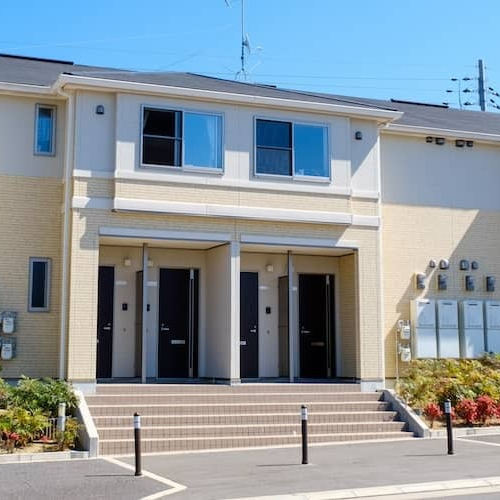What is a multifamily home and is it right for you?
Contributed by Sarah Henseler
Feb 21, 2026
•5-minute read

A multifamily home, or a property with more than one housing unit, offers plenty of benefits for real estate investors. Purchasing a multifamily home can be a great way to get started in your real estate investing journey and to be able to generate passive income. Some benefits include the ability to apply for personal home loans and the ability to have your tenants pay for rent while you live in one unit for free.
Since real estate investing is a financially risky venture, it’s important to understand what this type of property is and whether buying one is right for you.
What is a multifamily home?
A multifamily home is a residential property that has more than one housing unit. Each unit is a separate living space with kitchens and bathrooms, even if these units happen to share walls. Examples of multifamily homes include duplexes, townhouses, and condos.
In general, multifamily homes refer to buildings with two to four units. Anything larger than that tends to be considered a commercial property.
Types of multifamily homes
Each type of multifamily home has its own slightly different characteristics.
Duplex, triplex, and fourplex
Each of these housing types speak to the number of units it has on the same property. A duplex has two, a triplex has three, and a fourplex has four units. They typically have shared walls and own separate entrances from the exterior.
Condominium
A condo is comprised of separate units housed inside one larger building. Each unit has its own individual amenities, and there may be shared ownership of common areas like hallways.
Apartment complex
An apartment complex is similar to a condo, except that it may have more units. It’s typically a building with five or more housing units, so it may not fall under the strict definition of a multifamily home. Renters may also share access to amenities like a pool, parking garage, and playground.
Semidetached house
A semidetached house is a single-family home that shares a wall with another home. Although commonly thought of as a multifamily home, semidetached houses may not be, depending on how the deed is classified.
Single-family vs. multifamily home: What’s the difference?
Investing in multifamily homes is different than if you were to invest in a single-family home. Some of these key differences include:
- Price: Single family homes tend to cost less than multifamily properties, which may be more prohibitive to new real estate investors.
- Mortgage requirements: In most cases, you may be able to use a traditional mortgage to purchase a multifamily property. Some lenders may require that you take out a commercial real estate loan, with higher down payment requirements and more strict credit criteria.
- Resale potential: Single-family homes may be easier to sell compared to multifamily units.
- Scalability: Typically, there is more potential to scale and earn more income from a multifamily property. You can also apply a strategy called house hacking, where you live in one unit while renting the others out.
The pros and cons of investing in a multifamily home
Like other types of real estate investing, investing in multifamily homes has advantages and disadvantages. Use this list to determine if this type of property fits their budget and needs.
Pros of investing in a multifamily home
- Increased cash flow: Income you generate from rental income can help pay for your daily costs, even after accounting for expenses related to the property.
- Larger pool of tenants: A multifamily home gives you more units and more may apply to rent them. Having a larger pool of tenants can make it easier to find qualified ones.
- Expanded investment portfolio: This type of property helps to spread out your risk a bit and expands your real estate portfolio, because you can still earn rental income even if one or two units are sitting vacant, compared to a single family home.
Cons of investing in a multifamily home
- Higher purchase price: A multifamily home costs more compared to a single-family home, meaning you’ll need to make a larger up-front investment.
- Landlord costs and responsibilities: With more units come increased costs. There may also be more management responsibilities like multiple repair requests.
- Risk of vacancies: Having more units means that there may be a chance one or more of your units will sit vacant.
How to finance a multifamily home
You can use different types of home loans to finance a multifamily home, including:
- Conventional loans: These types of loans are from private lenders, and may require a higher minimum credit score for an investment property.
- FHA loans: Loans backed by the government tend to require less stringent requirements, but the home needs to be your primary residence in order to qualify.
- VA loans: Only qualified military members, veterans and their spouses can take out this government-backed loan.
Many lenders will require that you live in the home as your primary residence to qualify. If so, you can consider house hacking to do so.
Buying a property with five or more units means that you’ll need a commercial loan. Rocket Mortgage doesn’t offer commercial loans at this time, but we are committed to helping you understand your options.
Who is a multifamily home best for?
Investing in a multifamily home is best suited for someone who has the capital to invest in purchasing one and any expenses needed to get the property ready for tenants. Those who want to manage the property themselves and want to house hack may also benefit from investing in this type of property.
Wherever type of investment property you own, you will need to be prepared to take on the responsibility and risk of being a landlord.
What to look for when buying a multifamily home
When buying multifamily properties, location is key. It’s one of the main factors that influence whether tenants will want to live there. Understanding the location will also help you to price and market the property.
Other factors to look at include the number of units, as that will affect how much property you can afford and the potential income you can earn. Use this and the purchase price as a factor to assess where the realistic income you can earn with this property is worth it to you.
Working with a real estate agent can also help you assess and find suitable properties for your needs.
FAQ about multifamily property investing
Learn more about investing in multifamily properties
What qualifies as a multifamily home?
A multifamily home is a property that has at least two separate units in a residential home.
Can I buy a multifamily home with an FHA loan?
It’s possible to buy a multifamily home with an FHA loan. Typically, you can only purchase a home up to four units, and one of them needs to be your primary residence.
Is it harder to get a loan for multifamily homes?
You may find that there are more stringent eligibility requirements for multifamily homes. However, lenders may allow you to count the rental income you can earn from the property toward your income to help you qualify.
Can I buy a multifamily home with no money down?
In most cases, you will need to make a down payment to purchase a multifamily home. One exception is a VA loan. If you qualify, you may be able to purchase one as little as no money down.
What credit score do I need to get a multifamily home loan?
Credit score requirements vary by lender. For example, many conventional leaders require a 620 minimum score, while government backed loans may be lower.
The bottom line: Multifamily homes make great investments
If you have the means and desire to take on the responsibility of one, multifamily homes can make a great investment. With the ability to rent out multiple units and take advantage of strategies like house hacking, you can scale and earn more income compared to a single-family home.
Ready to get started? Start the financing process with Rocket Mortgage today to see what your options are.
Rocket Mortgage is a trademark of Rocket Mortgage, LLC or its affiliates.
Rocket Mortgage is a VA-approved lender, not endorsed or sponsored by the Dept. of Veterans Affairs or any government agency.

Sarah Li Cain
Sarah Li Cain is a freelance personal finance, credit and real estate writer who works with Fintech startups and Fortune 500 financial services companies to educate consumers through her writing. She’s also a candidate for the Accredited Financial Counselor designation and the host of Beyond The Dollar, where she and her guests have deep and honest conversations on how money affects our well-being.
Related resources

3-minute read
Fourplex basics: What you should know before you invest
A fourplex is a multifamily home with four separate living spaces. Learn about the pros and cons of investing in a fourplex to make the most of your purchase...
Read more

6-minute read
A guide to investing in mixed-use properties
A mixed-use property is a form of real estate that includes both commercial and residential units. Learn about investing in mixed-use properties with our gui...
Read more

8-minute read
Buying a house with tenants: A guide
Buying a house with tenants means earning income and assuming responsibility for maintaining it immediately. Find out what it means to buy a house with tenants.
Read more